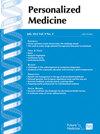Artificial intelligence in healthcare: a primer for medical education in radiomics.
IF 1.8
4区 医学
Q3 PHARMACOLOGY & PHARMACY
引用次数: 7
Abstract
The application of artificial intelligence (AI) to healthcare has garnered significant enthusiasm in recent years. Despite the adoption of new analytic approaches, medical education on AI is lacking. We aim to create a usable AI primer for medical education. We discuss how to generate a clinical question involving AI, what data are suitable for AI research, how to prepare a dataset for training and how to determine if the output has clinical utility. To illustrate this process, we focused on an example of how medical imaging is employed in designing a machine learning model. Our proposed medical education curriculum addresses AI's potential and limitations for enhancing clinicians' skills in research, applied statistics and care delivery.
医疗保健中的人工智能:放射组学医学教育入门。
近年来,人工智能(AI)在医疗保健领域的应用获得了极大的热情。尽管采用了新的分析方法,但关于人工智能的医学教育仍然缺乏。我们的目标是为医学教育创建一个可用的人工智能入门。我们将讨论如何生成涉及人工智能的临床问题,哪些数据适合人工智能研究,如何准备用于训练的数据集以及如何确定输出是否具有临床实用性。为了说明这一过程,我们重点介绍了一个如何使用医学成像来设计机器学习模型的例子。我们提出的医学教育课程将解决人工智能在提高临床医生在研究、应用统计和护理服务方面的技能方面的潜力和局限性。
本文章由计算机程序翻译,如有差异,请以英文原文为准。
求助全文
约1分钟内获得全文
求助全文
来源期刊

Personalized medicine
医学-药学
CiteScore
3.30
自引率
4.30%
发文量
49
审稿时长
6-12 weeks
期刊介绍:
Personalized Medicine (ISSN 1741-0541) translates recent genomic, genetic and proteomic advances into the clinical context. The journal provides an integrated forum for all players involved - academic and clinical researchers, pharmaceutical companies, regulatory authorities, healthcare management organizations, patient organizations and others in the healthcare community. Personalized Medicine assists these parties to shape thefuture of medicine by providing a platform for expert commentary and analysis.
The journal addresses scientific, commercial and policy issues in the field of precision medicine and includes news and views, current awareness regarding new biomarkers, concise commentary and analysis, reports from the conference circuit and full review articles.
 求助内容:
求助内容: 应助结果提醒方式:
应助结果提醒方式:


